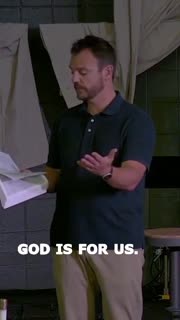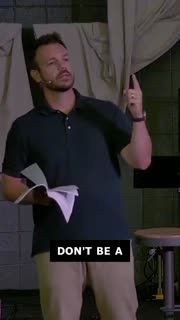Embracing Reconciliation: The Prodigal Son's Journey
Devotional
Sermon Summary
Bible Study Guide
Sermon Clips
### Quotes for Outreach
1. "God is for us. And we, and you and I, we need to know that that's what God is like. We need to know that we have a heavenly father that is always waiting for us to come home no matter what dumb stuff we do." [54:19] (17 seconds)
2. "Heaven loves homecomings. And so should we. And when I mean homecoming, I mean it exactly the way Jesus does right here in Luke chapter 15. It's people coming home to God no matter what their lostness looks like." [01:01:09] (20 seconds)
3. "God's love is more powerful. Than any mess that you make. No desire, no mistake, no sin is enough to keep God from loving you. And every son, every younger son needs to know how much the father loves them and that healing and reconciliation is possible." [56:04] (20 seconds)
4. "Don't be a younger brother. Unwilling or afraid to come home. Don't be an older brother. Uncaring about people coming home or making it difficult. Be our Father, who just wants us all to come home. Heaven loves homecomings, and so should we." [01:10:45] (26 seconds)
5. "If you identify with that younger son, don't be afraid to come home to God. God made you to be with him forever. God's love, God loves you more than you can imagine." [55:16] (13 seconds)
### Quotes for Members
1. "Both brothers are lost. Both are far. They're far from their father, but in different ways. And how does the father respond to his older son? Again, verse 28. So his father went out and pleaded with him. He treats him the same way he does the younger son. He goes out and he begs him, please come in." [59:26] (22 seconds)
2. "Why does Jesus tell this story? Well, he wants the tax collectors and sinners who are curious and have gathered, and he wants them to know the father's heart for them, that they, no matter what they do, they're welcome to come back home. But he also wants the Pharisees and the religious experts to know God, the father's heart for them." [01:00:14] (22 seconds)
3. "So here's the bottom line. Heaven loves homecomings. And so should we. And when I mean homecoming, I mean it exactly the way Jesus does right here in Luke chapter 15. It's people coming home to God no matter what their lostness looks like." [01:01:09] (23 seconds)
4. "Do you pray for lost people? In other words, do you pray that more people, more people would come to know and trust Jesus Christ? A few years ago, the Church of England ran a campaign. And the whole campaign was, we just want people to pray that more people would know Jesus." [01:04:39] (18 seconds)
5. "But don't forget, don't forget how hard it is to be that new person who comes in for the first time. That new person trying to find that gap there between those two people talking, who just, they seem like they know each other so well, why should I interrupt? Go out of your way to introduce yourself to someone you don't know." [01:06:26] (22 seconds)
Ask a question about this sermon
1. "God is for us. And we, and you and I, we need to know that that's what God is like. We need to know that we have a heavenly father that is always waiting for us to come home no matter what dumb stuff we do." [54:19] (17 seconds)
2. "Heaven loves homecomings. And so should we. And when I mean homecoming, I mean it exactly the way Jesus does right here in Luke chapter 15. It's people coming home to God no matter what their lostness looks like." [01:01:09] (20 seconds)
3. "God's love is more powerful. Than any mess that you make. No desire, no mistake, no sin is enough to keep God from loving you. And every son, every younger son needs to know how much the father loves them and that healing and reconciliation is possible." [56:04] (20 seconds)
4. "Don't be a younger brother. Unwilling or afraid to come home. Don't be an older brother. Uncaring about people coming home or making it difficult. Be our Father, who just wants us all to come home. Heaven loves homecomings, and so should we." [01:10:45] (26 seconds)
5. "If you identify with that younger son, don't be afraid to come home to God. God made you to be with him forever. God's love, God loves you more than you can imagine." [55:16] (13 seconds)
### Quotes for Members
1. "Both brothers are lost. Both are far. They're far from their father, but in different ways. And how does the father respond to his older son? Again, verse 28. So his father went out and pleaded with him. He treats him the same way he does the younger son. He goes out and he begs him, please come in." [59:26] (22 seconds)
2. "Why does Jesus tell this story? Well, he wants the tax collectors and sinners who are curious and have gathered, and he wants them to know the father's heart for them, that they, no matter what they do, they're welcome to come back home. But he also wants the Pharisees and the religious experts to know God, the father's heart for them." [01:00:14] (22 seconds)
3. "So here's the bottom line. Heaven loves homecomings. And so should we. And when I mean homecoming, I mean it exactly the way Jesus does right here in Luke chapter 15. It's people coming home to God no matter what their lostness looks like." [01:01:09] (23 seconds)
4. "Do you pray for lost people? In other words, do you pray that more people, more people would come to know and trust Jesus Christ? A few years ago, the Church of England ran a campaign. And the whole campaign was, we just want people to pray that more people would know Jesus." [01:04:39] (18 seconds)
5. "But don't forget, don't forget how hard it is to be that new person who comes in for the first time. That new person trying to find that gap there between those two people talking, who just, they seem like they know each other so well, why should I interrupt? Go out of your way to introduce yourself to someone you don't know." [01:06:26] (22 seconds)










